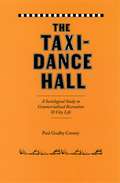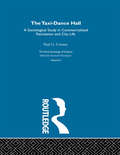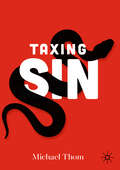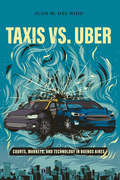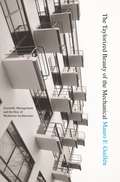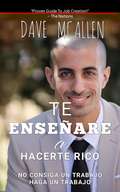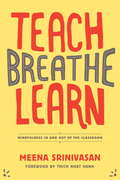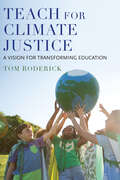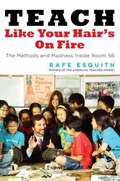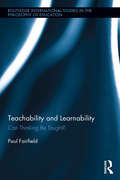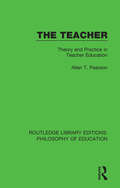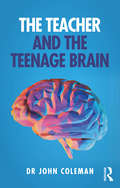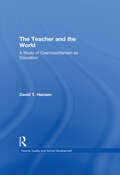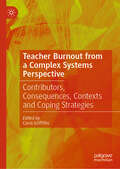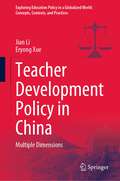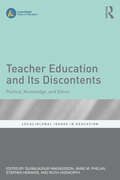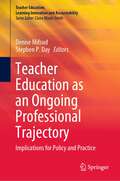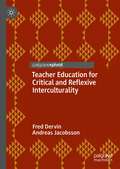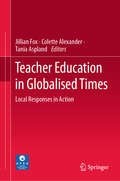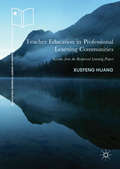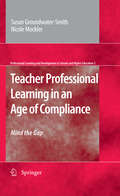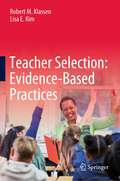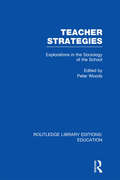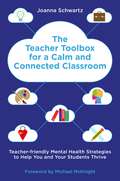- Table View
- List View
The Taxi-Dance Hall: A Sociological Study in Commercialized Recreation and City Life
by Cressey Paul G.First published in 1932, The Taxi-Dance Hall is Paul Goalby Cressey’s fascinating study of Chicago’s urban nightlife—as seen through the eyes of the patrons, owners, and dancers-for-hire who frequented the city’s notoriously seedy “taxi-dance” halls. Taxi-dance halls, as the introduction notes, were social centers where men could come and pay to dance with “a bevy of pretty, vivacious, and often mercenary” women. Ten cents per dance was the usual fee, with half the proceeds going to the dancer and the other half to the owner of the taxi-hall. Cressey’s study includes detailed maps of the taxi-dance districts, illuminating interviews with dancers, patrons, and owners, and vivid analyses of local attempts to reform the taxi-dance hall and its attendees. Cressey’s study reveals these halls to be the distinctive urban consequence of tensions between a young, diverse, and economically independent population at odds with the restrictive regulations of Prohibition America. Thick with sexual vice, ethnic clashes, and powerful undercurrents of class, The Taxi-Dance Hall is a landmark example of Chicago sociology, perfect for scholars and history buffs alike.
The Taxi-Dance Hall (The\making Of Sociology Ser.)
by Paul G. CresseyFirst published in 2003. This is Volume II of eight in the Early Sociology of Culture collection and offers a sociological study on the commercialized recreation. Paul G. Cressey while serving as a case-worker and special investigator for the Juvenile Protective Association was requested during the summer of 1925 to report upon the new and then quite unfamiliar closed dance halls. This book is in a sense the outgrowth of those assignments.
Taxing Sin
by Michael ThomConventional wisdom dictates that those goods which are said to cause harm or impose costs on society deserve a special tax. For centuries, governments have levied these "sin taxes" on alcohol and tobacco, but the list of taxable sins has now grown to include soda and marijuana, with calls to impose further taxes on plastic bags, meat, and even robots and carbon. Contrary to what experts and policymakers tell us, many of these alleged sins impose very little, if any, cost on society, and the harms that do exist can be minimized without resorting to tax. What follows in this book is a discussion of four case studies—on tobacco, marijuana, alcohol and soda—which make the case against the conventional wisdom in taxing these "sins", before concluding that when it comes to taxing sin, it is time for governments to forgive—and forget.
Taxis vs. Uber: Courts, Markets, and Technology in Buenos Aires
by Juan Manuel del NidoUber's April 2016 launch in Buenos Aires plunged the Argentine capital into a frenzied hysteria that engulfed courts of law, taxi drivers, bureaucrats, the press, the general public, and Argentina's president himself. Economist and anthropologist Juan M. del Nido, who had arrived in the city six months earlier to research the taxi industry, suddenly found himself documenting the unprecedented upheaval in real time. Taxis vs. Uber examines the ensuing conflict from the perspective of the city's globalist, culturally liberal middle class, showing how notions like monopoly, efficiency, innovation, competition, and freedom fueled claims that were often exaggerated, inconsistent, unverifiable, or plainly false, but that shaped the experience of the conflict such that taxi drivers' stakes in it were no longer merely disputed but progressively written off, pathologized, and explained away. This first book-length study of the lead-up to and immediate aftermath of the arrival of a major platform economy to a metropolitan capital considers how the clash between Uber and the traditional taxi industry played out in courtrooms, in the press, and on the street. Looking to court cases, the politics of taxi licenses, social media campaigns, telecommunications infrastructure, public protests, and Uber's own promotional materials, del Nido examines the emergence of "post-political reasoning": an increasingly common way in which societies neutralize disagreement, shaping how we understand what we can even legitimately argue about and how.
The Taylorized Beauty of the Mechanical: Scientific Management and the Rise of Modernist Architecture (Princeton Studies in Cultural Sociology #10)
by Mauro F. GuillénThe dream of scientific management was a rationalized machine world where life would approach the perfection of an assembly line. But since its early twentieth-century peak this dream has come to seem a dehumanizing nightmare. Henry Ford's assembly lines turned out a quarter of a million cars in 1914, but all of them were black. Forgotten has been the unparalleled new aesthetic beauty once seen in the ideas of Ford and scientific management pioneer Frederick Winslow Taylor. In The Taylorized Beauty of the Mechanical, Mauro Guillén recovers this history and retells the story of the emergence of modernist architecture as a romance with the ideas of scientific management--one that permanently reshaped the profession of architecture. Modernist architecture's pioneers, Guillén shows, found in scientific management the promise of a new, functional, machine-like--and beautiful--architecture, and the prospect of a new role for the architect as technical professional and social reformer. Taylor and Ford had a signal influence on Bauhaus founder Walter Gropius and on Le Corbusier and his Towards a New Architecture, the most important manifesto of modernist architecture. Architects were so enamored with the ideas of scientific management that they adopted them even when there was no functional advantage to do so. Not a traditional architectural history but rather a sociological study of the profession of architecture during its early modernist period, The Taylorized Beauty of the Mechanical provides a new understanding of the degree to which modernist architecture emerged from a tradition of engineering and industrial management.
Te enseñaré a hacerte rico: No consiga un trabajo Haga un trabajo
by Dave McAllemLa gente no da lo que no tiene. Dave McAllen tiene trabajos. A los que escuchan, les da trabajo. Gana mucho dinero después de investigar las frustraciones y dolores más profundos de las personas y crear productos especiales que están sin explotar para ayudarlos a encontrar respuestas y soluciones. Entonces, si estás aquí, seguro que conseguirás el trabajo de tus sueños. Él le mostrará exactamente cómo gana miles cada semana con estos productos, en su conciencia de riqueza. Te enseñaré a hacerte rico, es un libro sobre los secretos de la riqueza de los exitosos y cómo aprovecharlos. Dave presenta a los lectores una guía práctica y probada para orientar los ingresos bajo demanda a nivel mundial, 24 horas al día, 7 días a la semana. Él le enseñará cómo hacer estos productos que aportan ese dinero y hacen su propio trabajo. Con esto, no buscará 50 formas de conseguir un trabajo. Esta es una garantía de trabajo.
Teach, Breathe, Learn: Mindfulness in and out of the Classroom
by Meena SrinivasanIn Teach, Breathe, Learn, Meena Srinivasan highlights how mindfulness can be an effective tool in the classroom. What makes this book truly unique is her perspective as a classroom teacher, wrestling daily with the conditions about which she writes. <P> <P> "Teach, Breathe, Learn provides accessible, practical application of mindfulness to overcome challenges faced during the school day." Testimonials from students and colleagues are woven throughout the book. Teach, Breathe, Learn is designed for educators at all levels, parents interested in sharing mindfulness with their children, and anyone curious about how to cultivate their own mindfulness practice and eventually teach mindfulness to others.Part 1 helps teachers develop compassion and shift from "reacting" to "responding" to demands.Part 2 offers techniques for cultivating loving-kindness, gratitude and seeing students, colleagues, and parents as oneself.The last section of the book introduces a curriculum teachers can use to incorporate mindfulness into their classroom, replete with lesson plans, handouts, and homework assignments.
Teach for Climate Justice: A Vision for Transforming Education
by Tom RoderickA proactive, inclusive plan for the cross-disciplinary teaching of climate change from preschool to high school. In Teach for Climate Justice, accomplished educator and social and emotional learning expert Tom Roderick proposes a visionary interdisciplinary and intersectional approach to PreK–12 climate education. He argues that meaningful instruction on this urgent issue of our time must focus on climate justice—the convergence of climate change and social justice—in a way that is emotionally safe, developmentally appropriate, and ultimately empowering. Drawing on examples of real-life educators teaching climate change, Roderick identifies eight key dimensions of climate education that will prepare students to face the challenges of the climate crisis and give them the means to take action. These dimensions include not only educating for a deep understanding of the scientific, geopolitical, and socioeconomic equity issues that surround global warming, but also cultivating appreciation for the environment, building a supportive community, and fostering active hope for the future. Roderick's intentional layering of skills will help students develop the knowledge and sense of agency necessary to engage in civil resistance and nonviolent activism. In support of this crucial endeavor, Roderick suggests evidence-based teaching strategies, practices that promote inclusivity, and tools for social and emotional learning. This timely and uplifting book lays out a powerful vision for teaching, learning, and curriculum development to nurture a generation of courageous, informed advocates for climate justice.
Teach like Your Hair's on Fire: The Methods and Madness Inside Room 56
by Rafe EsquithThis book is an inspiring guide to transforming every child's education. In a Los Angeles neighborhood plagued by guns, gangs, and drugs, there is an exceptional classroom known as Room 56.
Teachability and Learnability: Can Thinking Be Taught? (Routledge International Studies in the Philosophy of Education #40)
by Paul FairfieldDeep disagreements exist regarding what thinking and critical thinking are and to what extent they are teachable. Thinking is learned in some measure by all, but not everything that is learnable is also teachable in an institutional setting. In questioning the relationship between teachability and learnability, Fairfield investigates the implications of thinking as inquiry, education as the cultivation of agency, and self-education. By challenging some of the standard conceptions of thinking, the author explores the limits of teachability and advances critiques of standardized tests, digital learning technologies, and managerialism in education.
The Teacher: Theory and Practice in Teacher Education (Routledge Library Editions: Philosophy of Education #15)
by Allen T. PearsonIt is widely agreed that teacher education must consist of two general components. There is a knowledge component which contains specialized subject matter knowledge, and a practical component in which intending teachers develop skills and abilities. In this original and compelling work, first published in 1989, Pearson attempts to examine the connection between the two. This title will be of interest to students of education.
The Teacher and the Teenage Brain
by John ColemanThe Teacher and the Teenage Brain is essential reading for all teachers and students of education. This book offers a fascinating introduction to teenage brain development and shows how this knowledge has changed the way we understand young people. It provides a critical insight into strategies for improving relationships in the classroom and helping both adults and teenagers cope better with this stage of life. Dr John Coleman shows how teachers and students can contribute to healthy brain development. The book includes information about memory and learning, as well as guidance on motivation and the management of stress. Underpinned by his extensive work with schools, Dr Coleman offers advice on key topics including the importance of sleep, the social brain, moodiness, risk and risk-taking and the role of hormones. This book is extensively illustrated with examples from classrooms and interviews with teachers. It explicitly links research and practice to create a comprehensive, accessible guide to new knowledge about teenage brain development and its importance for education. Accompanied by a website providing resources for running workshops with teachers and parents, as well as an outline of a lesson plan for students, The Teacher and the Teenage Brain offers an innovative approach to the understanding of the teenage brain. This book represents an important contribution to teacher training and to the enhancement of learning in the classroom.
The Teacher and the World: A Study of Cosmopolitanism as Education (Teacher Quality and School Development)
by David T. HansenWinner of the 2013 American Educational Studies Association's 2013 Critics Choice Award! Teachers the world over are seeking creative ways to respond to the problems and possibilities generated by globalization. Many of them work with children and youth from increasingly varied backgrounds, with diverse needs and capabilities. Others work with homogeneous populations and yet are aware that their students will encounter many cultural changes in their lifetimes. All struggle with the contemporary conditions of teaching: endless top-down measures to manipulate what they do, rapid economic turns and inequality in supportive resources that affect their lives and those of their students, a torrent of media stimuli that distract educational focus, and growth as well as shifts in population. In The Teacher and the World, David T. Hansen provides teachers with a way to reconstruct their philosophies of education in light of these conditions. He describes an orientation toward education that can help them to address both the challenges and opportunities thrown their way by a globalized world. Hansen builds his approach around cosmopolitanism, an ancient idea with an ever-present and ever-beautiful meaning for educators. The idea pivots around educating for what the author calls reflective openness to new people and new ideas, and reflective loyalty toward local values, interests, and commitments. The book shows how this orientation applies to teachers at all levels of the system, from primary through university. Hansen deploys many examples to illustrate how its core value, a balance of reflective openness to the new and reflective loyalty to the known, can be cultivated while teaching different subjects in different kinds of settings. The author draws widely on the work of educators, scholars in the humanities and social sciences, novelists, artists, travellers and others from both the present and past, as well as from around the world. These diverse figures illuminate the promise in a cosmopolitan outlook on education in our time. In this pioneering book, Hansen has provided teachers, heads of school, teacher educators, researchers, and policy-makers a generative way to respond creatively to the pressure and the promise of a globalizing world.
Teacher As Stranger: Educational Psychology for the Modern Age
by Maxine GreeneTeacher as Stranger" is for the teacher or teacher-to-be as a detailed philosophical look at teaching and education through essays examining: "Being and Learning", "Knowledge: Science and Subjectivity", "Approaches to Truth and Belief", "Moral Dilemmas and Commitments", etc.
Teacher Burnout from a Complex Systems Perspective: Contributors, Consequences, Contexts and Coping Strategies
by Carol GriffithsThis edited book investigates the factors contributing to teacher burnout and its potential consequences. Topics include the relationship of burnout to cultural identity, modality and job satisfaction, and chapters discuss various settings such as the English as a Medium of Instruction (EMI) classroom, secondary and primary schools. The book aims to provide possible solutions and ways forward for tackling the issue of burnout, both at a personal and systemic level. It will be of interest to students and scholars in the fields of teacher education, wellbeing, school and schooling, as well as practising teachers and school leadership.
Teacher Development Policy in China: Multiple Dimensions (Exploring Education Policy in a Globalized World: Concepts, Contexts, and Practices)
by Jian Li Eryong XueThis book comprehensively explores the teacher development policy in China from multiple dimensions. It examines the leading value of 'Four Good Teachers', teacher salary management policy, teacher evaluation policy, teachers’ professional title appointment policy, teachers’ ethic policy in China’s education system, 'County management and school recruitment' policy in teacher management, teachers’ honor recognition policy, and teachers’ qualification management and policy in China. This book not only shares in-depth understanding to epitomize teacher development policies in China contextually, but also provides specific suggestions to address various challenges of teacher development policies both nationally and locally.
Teacher Education and Its Discontents: Politics, Knowledge, and Ethics (Local/Global Issues in Education)
by Anne M. Phelan Gunnlaugur Magnússon Stephen Heimans Ruth UnsworthThis unique collection of essays from researchers and teacher educators from around the world presents innovative approaches to education theory, critical policy analyses, de-colonializing reformulations of teacher education and a “standard of dissensus” for teacher education.This first volume from the International Teacher Education Research Collective (ITERC) illustrates common themes and problems in the politics of education, in particular, standardization, marketization, governance and policy in education, with both country-specific cases and generally formulated theoretical discussions. The book has three primary aims: to illustrate and critique the ethical, epistemological and political discourses shaping teacher education; to identify and unravel the entanglements of politics, knowledge and ethics in teacher education in a range of international settings; and to revitalize teacher education by proposing and exploring alternative modes of thought and practice. The volume contributes to further reflection and in-depth discussion in education, to the formulation of new areas for educational research and to critical resistance to hegemonic discourses of education.Making an important contribution to contemporary education discourse, this book is a useful guide for education researchers and theorists, teacher educators and postgraduate and higher degree research students in education.
Teacher Education as an Ongoing Professional Trajectory: Implications for Policy and Practice (Teacher Education, Learning Innovation and Accountability)
by Denise Mifsud Stephen P. DayThis edited book provides a critical re-reading of the concept of teacher education, in addition to a re-thinking of the sole focus on Initial Teacher Education (ITE), with implications for education policy, theory, and practice. This book presents new investigations that explore the concept of teacher education from ITE to retirement and how this is being enacted within the various distinct European and international education contexts. It demonstrates teaching and teacher education as a deeply contested field within European education and within the different national contexts of Europe. Contributions in this book expose teacher education as a continuum of teacher learning that is set off from the beginning of the teachers’ own schooling and continues throughout their entire teaching career. The chapters deal with various issues, namely teacher induction and mentoring; teacher agency; teachers as researchers; the role of the head teacher; schools as learning communities; and distinct ITE practices. It is intended for postgraduate students and researchers with an interest in teaching and teacher education, educational policies and politics, and educational philosophy, as well as practitioners.
Teacher Education for Critical and Reflexive Interculturality
by Fred Dervin Andreas JacobssonThis book deals with the importance of interculturality in teacher education and training. It is mostly through the concept of intercultural competence that interculturality has been constructed and problematized for educators. However, different approaches and paradigms are available and differ and/or share similarities in terms of ideology, method, practice, theoretical frameworks, and ethical considerations. There is no global agreement on the meanings of interculturality in teacher education and training, although some principles might be common across national borders. There is thus a need for educators to consider these aspects of interculturality in education to be able to become better teachers in a diverse world like ours.
Teacher Education in Globalised Times: Local Responses in Action
by Jillian Fox Colette Alexander Tania AsplandThis book provides commentary on the influence of multi-layered political contexts that surround the work of teacher educators worldwide. It addresses the drawbacks of the massification, standards-based movements and marketisation of universal business that threaten authenticity, innovation and entrepreneurship within teacher education on a global scale. The chapters celebrate the richly described local stories that explore the often tacit political activity that underpins teacher educators’ work. The book highlights the commitment of both teachers and teacher educators to social justice, and human rights and critical consciousness as central to the process of teacher development. Teacher formation, teacher education policies and curriculum development in an era of globalisation, super-diversity and the positioning of Indigenous populations, and national regulation and localisation are topics that are explored in this book.
Teacher Education in Professional Learning Communities: Lessons from the Reciprocal Learning Project (Intercultural Reciprocal Learning in Chinese and Western Education)
by Xuefeng HuangThis book explores the unique experiences of a sister school network in Canada and China contextualized through the lens of the Reciprocal Learning Project, which supports the relationship between a school network and teacher education exchange program of two countries. Huang uses theoretical viewpoints from teacher learning and comparative education research to analyse and interpret what has happened in the emerging cross-cultural school network. The book juxtaposes teacher learning and comparative education research from Shanghai and Ontario as teachers in the two places interact and provides detailed descriptions of teacher collaboration to show how these collaborations were initiated, developed, and sustained, as well as the impact brought about from these collaborations. The book offers a unique opportunity to examine how Canadian and Chinese teachers receive and react to opportunities of cross-cultural collaboration and learning.
Teacher Professional Learning in an Age of Compliance
by Susan Groundwater-Smith Nicole MocklerTeacher Professional Learning in an Age of Compliance: Mind the Gap examines ways in which practice-based inquiry in educational settings, in a number of different countries and contexts, can transcend current ways of working and thinking such that authentic professional learning is the result. The authors contend that education policy, under pressure from a number of quarters, is retreating into a standardized, audited, and backward-looking arena, with the advances of more progressive educational philosophy being rolled back. In an age where practitioner inquiry and action research have often been 'hijacked' for the purposes of broad-based policy implementation, this book offers a rationale for reclaiming the critical edge so fundamental to inquiry-based professional learning. It examines the potential of inquiry-based forms of teacher professional learning to contribute to the growth of professional knowledge for and about teachers' work. The authors intend that the book will assist in building new forms of professional knowledge that go beyond the current compliance model - engineered from less enduring materials - to inform a new model with its foundations in a strong ethical and moral framework. They also believe that this new model, if implemented, will help to reverse today's conservative educational trends and make teacher professional development a force for genuine progress once again. They have consciously moved away from the celebratory tone of much of the academic reporting of teacher professional learning, adopting instead a genuinely critical edge. In covering a wide range of policies and practices from across the international spectrum, they have allowed themselves the freedom to engage in serious epistemological arguments about the nature of professional knowledge, as well as how it is constructed and employed.
Teacher Selection: Evidence-Based Practices
by Robert M. Klassen Lisa E. KimMarketing text: This book combines theory and research from educational and organizational psychology to provide guidance on improving the teacher selection process and, subsequently, educational outcomes for all students. The book identifies the characteristics of effective teachers, analyzes research on selection practices, and examines new approaches to teacher selection, recruitment, and development. The central premise of the book is that improving the effectiveness of teachers – and, thus, students’ educational outcomes – can be achieved by making the recruitment and selection process more effective and more efficient. Accordingly, the book describes how to identify and select individuals for the teaching profession who display both strong cognitive attributes (e.g., subject knowledge) and essential non-cognitive attributes such as resilience, commitment to the profession, and motivation for teaching. Key topics Teacher selection practices from the viewpoint of organizational and educational psychology Teacher effectiveness and the role of individual attributes Situational judgment tests (SJTs) and multiple mini-interviews (MMIs) for teacher selection Implementation of teacher selection programs Teacher recruitment and development Given its scope, the book represents an essential reference guide for scholars, educational leaders and policymakers, and graduate students in educational leadership programs, as well as professionals in child and school psychology, educational psychology, teaching and teacher education.
Teacher Strategies: Explorations in the Sociology of the School (Routledge Library Editions: Education)
by Peter WoodsThis book takes as its focus the key interactionist concept of ‘strategy’, a concept fundamental to many current concerns in the sociology of the school, including the understanding of the links between society and the individual, a more accurate description of certain areas of school life and implications for the practice of teaching. ‘Strategy’ bears on all these issues. It concerns both goals, and ways of achieving them and short-term, immediate aims as well as long-term ones. The essays in this book share a common concern with teacher strategies, emphasizing the discovery of intentions and motives, alternative definitions of situations and the hidden rules that guide our behaviour. Amongst the areas investigated are the influence of factors outside the school in determining the role of the teacher, and the nature and influence of teacher commitment. The implications for practical action and policy making are stressed throughout, and by recognising and exploring the constraints and influences that operate on teachers, this work constructs a realistic appraisal of the teaching situation.
The Teacher Toolbox for a Calm and Connected Classroom: Teacher-Friendly Mental Health Strategies to Help You and Your Students Thrive
by Joanna SchwartzThe Teacher Toolbox for a Calm and Connected Classroom is a whole-child, whole-hearted approach to teaching, wellness, and student--teacher relationships.Chock-full of practical advice and brain-based tools from an experienced teacher and counselor, this book solves the question of how psychology and education can enrich and empower both teachers and students' wellness. Peppered with relatable anecdotes from the authors' experiences, the book deals with how to help unpack the' "invisible backpack" that both teachers and students bring into the classroom. Chapters are broken down to show how to practically address common issues such challenging behavior, social-emotional learning, trauma-informed education, attachment theory, mindfulness, mental health and much more. Each chapter outlines these common challenges but also provides an abundance of practical tools that can be used to help. Written accessibly, and with tools which are easy to implement, The Teacher Toolbox for a Calm and Connected Classroom is an indispensable guide for any teacher.
